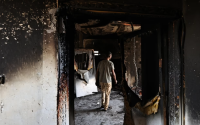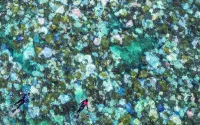18 September 2006The Independent
Which gathering of smart- suited, smart-minded men will lead to the largest amount of death this week? The answer seems obvious. Later today, foreign ministers from the African Union will meet at the United Nations in New York. Their job is to decide whether the two million black people left in Darfur live or die.
For the past year, a paltry 7,000 of the AU's soldiers have been standing between the terrorised, terrified black population of Darfur and the Janjaweed militiamen determined to genocide them from the face of the earth. The AU is scheduled to withdraw even this dismal little army at the end of this month. If the nations of the world do not provide a UN peacekeeping force to replace it, we can expect a string of sequels to Hotel Rwanda.
Yet - amazingly - this meeting has a competitor for the Grim Reaper Award for Meeting Most Likely to Lead to Mass Death. Starting today, the World Bank is holding its week-long annual rendezvous. Some critics have said it was inappropriate for the Bank to meet in Singapore, that shiny city-state whose citizens had better shut up Or Else, that Disneyland with capital punishment. I think it is wholly appropriate, because the World Bank "has condemned people to death ... They don't care if people live or die."
These are not the words of a leftie-liberal. They are the words of Jospeh Stiglitz, the Nobel Prize-winning economist - and the Bank's own former chief economist.
Across the developing world, there are trashed nations who curse the memory of the World Bank, like victims weeping at the memory of a confidence trickster. Argentina, Russia, Indonesia - all did exactly as the Bank demanded for the entire 1990s. All sold off every last scrap of state-owned services. All slashed taxes and made their citizens pay for schools and hospitals and water up-front, or go without. All worshiped at the feet of market fundamentalism. And all ended up plunged far deeper into poverty. Argentina was reduced by the Bank's dictates from a middle class country whose kids gorged on American fast food to a bankrupt nation whose kids eat from trashcans.
Many people believe the World Bank has ditched its old poor-trashing, structural-adjusting ways. The evidence, alas, suggests otherwise. Christian Aid has conducted a massive study of the Bank's loans under its new head, Paul Wolfowitz, and found the change has been "a grand exercise in spin ... Far from reforming their practices, [they] have found new and more intrusive ways of forcing their agenda on poor countries."
Of course, sometimes privatisation is a good policy, just as sometimes state provision is a good policy. Like everyone else in between Kim Jong Il and Dick Cheney, I believe in a mixed economy where you judge each case on its merits. But the World Bank forces privatisation as the solution to each and every problem, no matter how inappropriate. And this approach kills.
Look at water. We have seen in Britain how privatising this natural monopoly simply leads to massive corporate profits and a deteriorating service. Now imagine this was imposed undemocratically by a foreign power, and the cost was not simply spiralling water bills but outbreaks of cholera and e-coli in a country with barely any doctors.
Across the planet, the World Bank has refused to hand over cash to bitterly poor countries unless they price their water at market rates. Ghana - a country so poor one in 20 children is stillborn - was recently loaned $110m (£59m) by the Bank, on the condition that it doubles the price of water and electricity for ordinary Ghanaians. The desperate government felt it had no choice but to obey.
Women such as Hawa Amadu - a creased, crumpled widow in her seventies interviewed by the World Development Movement - were sent into panic. She already spends almost all her income on water and some days, like many Ghanaian women, went without water so her grandchildren could drink. If water increases in cost, she could die. "Am I supposed to drink air?" she asked.
There are women like Hawa all over the world. In South American barrios, I have seen children drinking from filthy, rusty barrels because the World Bank has priced clean water out of their reach. Following water privatisation, cholera has returned to the continent after a century. The World Bank does not do this because it is evil. It does it because it was set up by the American economist Henry Dexter White in the Forties to ensure "the more money you put in, the more votes you have" and "the US should have enough votes to block any decision". Some 51 per cent is still owned by the US Treasury, and its structures are geared to serve their interests, not the interests of the poor.
The British Government used to support enthusiastically this policy of no-aid-until-you-privatise, including in Ghana. But in 2005 they responded to pressure from Make Poverty History - who says the campaign made no difference? - and decoupled aid from these market fundamentalist conditions. Now the International Development Secretary, Hilary Benn, is trying to force the World Bank to do the same. He has withheld the (too small) sum of £50m from Britain's £1.3bn contribution to the Bank in protest.
This decision has been greeted with some astonishingly dishonest criticisms. My colleague Dominic Lawson and my friend Nick Cohen have responded by serving up a dish of red herrings with a side-order of straw men. They have angrily asked why Hilary Benn and the Bank's critics are so keen to remove the conditionalities which prevent loans going to the corrupt and the dictatorial. There's a simple answer: we aren't. You made it up. We are in favour of removing the conditionalities that force privatisation on the poor. They. Are. Totally. Different. Things. In a further act of obfuscation, they have talked at length about Paul Wolfowitz's personality, as if international finance institutions can be debated at the level of Heat magazine. They tell us all about Wolfowitz's childhood and his personal kindness, as if this is a match for hard statistics about the World Bank's effects. But even on their own terms, it seems strange to hold up as a poster-boy for anti-corruption the man whose job throughout the 1980s was to funnel money on behalf of the US government to Haji Mohammed Suharto, the genocidal dictator of Indonesia. It seems stranger still when you remember he came to the World Bank fresh from an administration blocking all attempts to deal with the biggest threat to our species - global warming - because it is in hock to Big Oil.
The opponents of the World Bank are, in reality, standing against the corruption concentrated this week in Singapore. Does anyone doubt it is corrupt to demand the poorest people in the world pay twice as much to a private monopoly for their buckets of clean water or drink from filthy, contaminated barrels, just so your corporate friends can get richer? Isn't that the greatest and most deadly corruption of all - imposed on the world by the Bank every day of the week?






